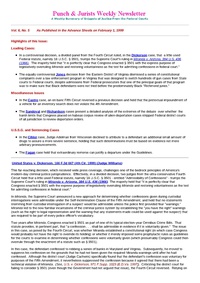Here Judge Adelman rejected the automatic increase of sentences by blindly using the principles of relevant conduct, stating that sentencing determinations must be based on evidence and reasoned analysis, not mere arbitrary pronouncements.
The defendant in this case pled guilty to possession of 499.28 grams of cocaine with …
Case held that for purposes of appealing sentences within the 7-day period specified in Rule 35(c), a sentence is "imposed" when it is orally pronounced - not when the written judgment is entered - although that issue has divided the Circuits.
"The question presented is whether the initial …
QUOTE OF THE WEEK - Some reasons why fairness mandates that sentences be imposed by an impartial and unbiased authority.
"Due process in sentencing, should, at its most basic, include the right to be sentenced by an impartial authority, unbiased and not predisposed in any direction. . . . …
Reversing both the lower court decision and a panel's earlier affirmance of that decision, the en banc court held that the "in furtherance of" element of the offense charged is not limited solely to those who support the presense of illegal aliens.
Sandoval v. Reno, 166 F.3d 225 (3rd Cir. 1999) (Judge Sloviter)
Richardson v. Reno, 162 F.3d 1338 (11th Cir. 1998) (Judge Hull)
These two decisions represent the opposite extremes of the current Circuit Court split over the question of whether the district courts retain any supervisory control over decisions …
The Court noted that the Ninth, First and Eighth Circuits have held that the Government is restricted to evidence acquired at the time of the complaint (see U.S. v. $191,910.00 in United States Currency, 16 F.3d 1051, 1066-67 (9th Cir. 1994); U.S. v. One Lot of U.S. Currency ($36,634), …
This case explored the "inherent coercion of the custodial setting" that was addressed in Miranda v. Arizona, 384 U.S. 436 (1996). The defendant in this case was convicted of a conspiracy to distribute child pornography. He appealed his conviction, principally on the grounds that the district court had erred …
Sandoval v. Reno, 166 F.3d 225 (3rd Cir. 1999) (Judge Sloviter)
Richardson v. Reno, 162 F.3d 1338 (11th Cir. 1998) (Judge Hull)
These two decisions represent the opposite extremes of the current Circuit Court split over the question of whether the district courts retain any supervisory control over decisions …
We first noted this case in the December 29, 1997 issue of Punch and Jurists. In a decision reported at 129 F.3d 752 (5th Cir. 1997), a panel of the Fifth Circuit vacated a drug conviction on the grounds that Government officials didn't have any probable cause to justify …
In this case the Tenth Circuit held that a district court may grant a downward departure from the Sentencing Guidelines if it finds that the defendant shows remorse to an exceptional degree. The defendant filed a motion for a downward departure on the grounds of exceptional remorse. The Government …
In this case the Tenth Circuit held that a district court may grant a downward departure from the Sentencing Guidelines if it finds that the defendant shows remorse to an exceptional degree. The defendant filed a motion for a downward departure on the grounds of exceptional remorse. The Government …
Excerpts from P&J, 11/15/99 in which we discussed the Supreme Court's decision to review the Fourth Circuit's decision in the Miranda case.
[From Vol. 6, Nos. 45 & 46, dated November 15,1999]
In February, 1999, a divided panel from the Fourth Circuit issued its ruling in this case, …
In this case the Fourth Circuit held that "it is perfectly clear that Congress enacted [18 USC] § 3501with the express purpose of legislatively overruling Miranda [v. Arizona] and restoring voluntariness as the test for admitting confessions".
[From Vol. 6, No. 5, dated February 1, 1999]
This far-reaching …
Quote of the Week from the 9/13/99 issue of P&J commenting on an article entitled "Miranda on the Hot Seat" which appeared in the New York Times Magazine on Sept. 26, 1999 which commented on the Dickerson case.
[From Vol. 6, No. 37, dated 9/13/99]
In the 3/15/99 …
Here the Court rejected a claim of racial discrimination that arose from the state prosecutor's practice of referring all criminal cases involving guns to federal authorities, where the jury-pool make-up contained significantly less Blacks.
This is another strange decision from the Fourth Circuit. While it involved serious claims …
